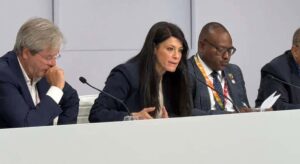Having good air quality is not cheap, but your investment is vital and must be addressed from multiple fronts. Atmospheric pollutants come from multiple sources, with transportation being the second most polluting sector in Europe and the first nationally. In the European Union, transportation accounts for 25% of greenhouse gas emissions, while in Spain that percentage rises to 30%.
Investing in infrastructure to reduce road freight transportation, financing new vehicle fleets, and improving the control and measurement of combustion engine gases are critical actions. Although ‘cleaning’ the air is not cheap, it is essential, as air pollution affects not only the environment but also human health, a problem increasingly evidenced by science.
In a recent interview with Covadonga Astorga, an expert from the European Commission’s Joint Research Centre (EC-JRC), these issues were discussed at the ‘Science for Public Policy’ event held at the Círculo de Bellas Artes in Madrid. Astorga, who works in a vehicle emissions laboratory in Ispra, Italy, where her center tests vehicle engines to measure gases before they hit the market, highlighted the importance of these measurements to underpin EU regulations and steer the industry towards more sustainable practices.
The JRC, with more than 3,000 employees in five European countries, provides independent scientific advice on topics such as health, emissions, cybersecurity, and artificial intelligence. Astorga’s team specializes in vehicle emissions testing, evaluating the release of gases and particles before vehicles enter the market. These measurements are essential for developing legislation and monitoring industrial production.
However, economic factors and conflicts can delay these initiatives. Inflation in the Eurozone has postponed the implementation of Euro 7 regulations, which will allow for measuring emissions of polluting gases under real conditions, until 2027. This regulation paves the way for 2035, the year when the production of combustion engine cars in Europe is planned to be ceased.
In her statements, Astorga explained that her role in the Joint Research Centre in Ispra is to support and provide scientific advice to the European Commission for the preparation and discussion of proposals regarding transportation emissions, such as the Euro 7 regulation. The JRC not only develops these regulations but also monitors their implementation and compliance.
Astorga emphasized the importance of having a research body within the European Commission, as it allows for anticipating problems and providing data based on scientific evidence, something vital for the development of effective policies. Her work also involves collaborating with Member States and vehicle manufacturers, participating in global meetings sponsored by the United Nations to discuss and develop technical regulations.
Astorga highlighted that the Euro 7 regulation will be crucial for emission control, as it will measure emissions under real-world conditions, a significant improvement over current laboratory measurements. Portable emission systems will allow for recording levels of nitrogen oxides, CO2, and particles in all types of roads and driving conditions.
Regarding the future of emissions research, Astorga mentioned that the JRC is adapting to the growing electric market. The transition to electric vehicles and the search for alternative fuels for trucks and airplanes will continue to be areas of interest.
Finally, Astorga reflected on the challenges and importance of scientific communication in policy decisions, emphasizing that her effort is aimed at effectively conveying the importance of her research to society, ensuring that citizens understand and benefit from advances in this field.
Source: MiMub in Spanish












